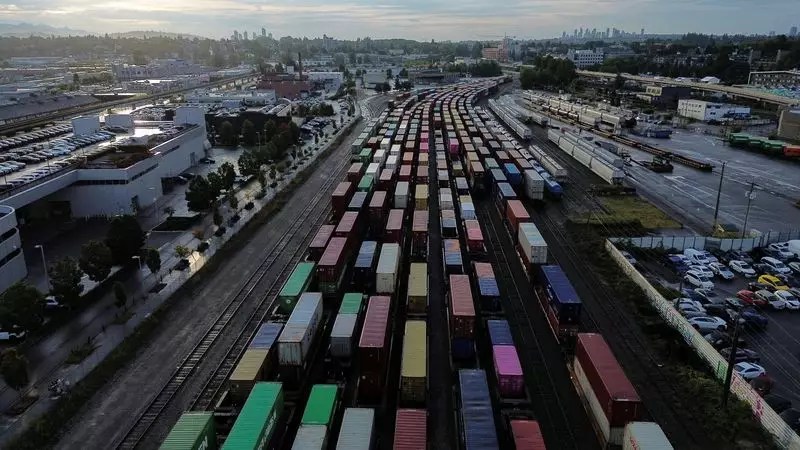The recent rail stoppage in Canada, caused by a labor dispute between the Teamsters union and the country’s two major freight rail operators, Canadian National Railway and Canadian Pacific Kansas City, has the potential to have a significant impact on the nation’s economy. Economists and analysts have warned that if the stoppage continues for an extended period, it could lead to billions of dollars in economic losses, resulting in job losses and increased consumer prices.
According to Pedro Antunes, chief economist at the Conference Board of Canada, a prolonged two-week rail strike could result in a $3-billion loss in nominal GDP this year, with a four-week strike potentially lowering GDP by nearly $10 billion in 2024. This scenario could also lead to around 49,000 job losses within the year, painting a grim picture of the economic consequences of an extended rail stoppage in Canada.
Robert Kavcic, a senior economist with BMO Capital Markets, highlighted that the simultaneous stoppage of the majority of Canada’s rail freight is “growth-negative and inflation-positive.” He estimated that the stoppage could shave around 0.1 percentage points off economic growth each week, with an impact of over $2 billion in nominal GDP terms. This could have a compounding effect the longer the stoppage persists, potentially causing further economic strain.
Canada’s economy has already been facing challenges, with lackluster economic growth and rising unemployment rates. The recent rail stoppage adds another layer of uncertainty and potential economic disruption to an already fragile economic environment. The impact of the rail stoppage could exacerbate existing economic issues and hinder the country’s path to recovery.
Canada heavily relies on CN and CPKC to transport a wide range of goods, including grain, fertilizers, chemicals, and automobiles. The total rail freight cargo hauled annually in Canada exceeds C$380 billion, with the vast majority moving on the tracks operated by these two companies. A prolonged stoppage in rail freight services could disrupt supply chains, impacting various industries and potentially leading to economic inertia.
Experts like Derek Holt, head of capital markets economics at Scotiabank, have warned that even a short-term rail strike could have a monthly drag on GDP, and the impact would escalate with each passing day of the strike. The ripple effects of a prolonged stoppage could be felt across the economy, affecting businesses, consumers, and overall economic growth.
Given the potential economic consequences of an extended rail stoppage, it is crucial for both the rail operators and the labor union to reach a swift resolution to the ongoing dispute. Past rail stoppages in Canada have typically been short-lived, with minimal economic impact. However, if the current stoppage persists for an extended period, the economic damage could be significant.
The rail stoppage in Canada has the potential to have far-reaching economic implications, affecting GDP, job numbers, consumer prices, and overall economic growth. It is imperative for all parties involved to prioritize resolving the dispute and minimizing the economic impact on Canada’s economy.


Leave a Reply